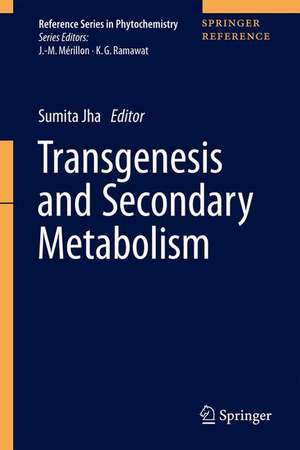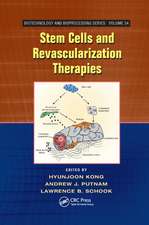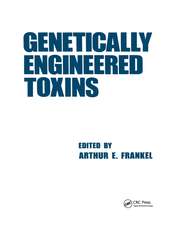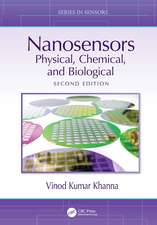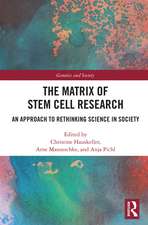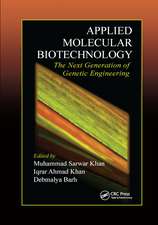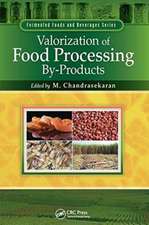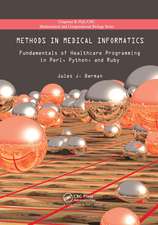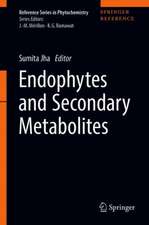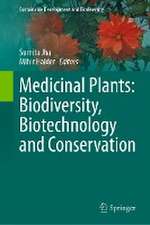Transgenesis and Secondary Metabolism: Reference Series in Phytochemistry
Editat de Sumita Jhaen Limba Engleză Hardback – 16 mai 2017
Since many commercially valuablesubstances are still extracted from plants, being largely inaccessible to efficient modern laboratory synthesis methods, this book provides a valuable resource of information for biotechnological approaches that can help to find alternative and more efficient methods for the production of natural secondary metabolites. Thus adjusted production methods, with the help of tailored plant systems, can potentially help to release the stress on plants, which are currently suffering from extensive human harvesting, and to conserve global biodiversity.
Readers will find comprehensive reference information on plant genetic manipulation toward more efficient synthesis, accumulation and production of target secondary metabolites. The handbook will appeal to researchers and professionals, but also graduate students and scholars working in the fields of biotechnology, genetic engineering, medicinal plant research, pharmacy, and phytochemistry.
Din seria Reference Series in Phytochemistry
- 18%
 Preț: 2669.64 lei
Preț: 2669.64 lei - 18%
 Preț: 3938.69 lei
Preț: 3938.69 lei - 18%
 Preț: 3242.79 lei
Preț: 3242.79 lei - 18%
 Preț: 3248.37 lei
Preț: 3248.37 lei - 18%
 Preț: 2066.14 lei
Preț: 2066.14 lei - 5%
 Preț: 3085.16 lei
Preț: 3085.16 lei - 18%
 Preț: 1494.03 lei
Preț: 1494.03 lei - 18%
 Preț: 1965.48 lei
Preț: 1965.48 lei - 18%
 Preț: 2100.22 lei
Preț: 2100.22 lei - 18%
 Preț: 1661.64 lei
Preț: 1661.64 lei - 24%
 Preț: 2010.05 lei
Preț: 2010.05 lei - 24%
 Preț: 1444.57 lei
Preț: 1444.57 lei - 24%
 Preț: 1841.23 lei
Preț: 1841.23 lei - 24%
 Preț: 2842.83 lei
Preț: 2842.83 lei - 24%
 Preț: 2667.77 lei
Preț: 2667.77 lei - 24%
 Preț: 2840.19 lei
Preț: 2840.19 lei - 9%
 Preț: 2173.77 lei
Preț: 2173.77 lei - 9%
 Preț: 2644.03 lei
Preț: 2644.03 lei - 9%
 Preț: 3584.53 lei
Preț: 3584.53 lei
Preț: 1087.46 lei
Preț vechi: 1326.18 lei
-18% Nou
Puncte Express: 1631
Preț estimativ în valută:
208.12€ • 216.18$ • 172.87£
208.12€ • 216.18$ • 172.87£
Carte disponibilă
Livrare economică 13-27 ianuarie 25
Preluare comenzi: 021 569.72.76
Specificații
ISBN-13: 9783319286686
ISBN-10: 3319286684
Pagini: 500
Ilustrații: XVIII, 649 p. 108 illus., 65 illus. in color.
Dimensiuni: 155 x 235 mm
Greutate: 0.2 kg
Ediția:1st ed. 2017
Editura: Springer International Publishing
Colecția Springer
Seria Reference Series in Phytochemistry
Locul publicării:Cham, Switzerland
ISBN-10: 3319286684
Pagini: 500
Ilustrații: XVIII, 649 p. 108 illus., 65 illus. in color.
Dimensiuni: 155 x 235 mm
Greutate: 0.2 kg
Ediția:1st ed. 2017
Editura: Springer International Publishing
Colecția Springer
Seria Reference Series in Phytochemistry
Locul publicării:Cham, Switzerland
Public țintă
ResearchCuprins
Part I General Aspects of Transgenesis and Secondary Metabolism: DNA Transfer to Plants by Agrobacterium rhizogenes: A Model for Genetic Communication Between Species and Biospheres.- Secondary Metabolism and the Rationale for Systems Manipulation.- Plant Cell Cultures as Producers of Secondary Metabolites: Podophyllum Lignans as a Model.- Secondary Metabolite Production in Transformed Cultures.- Antimalarial Compound Synthesis from Transgenic Cultures.- Evaluation of Agrobacterium tumefaciens Usefulness for the Transformation of Sage (Salvia Officinalis L.).- Ruta Graveolens: Phytochemistry, Pharmacology and Biotechnology.- Secondary Metabolite Profile of Transgenic Centaury (Centaurium erythraea Rafn.) Plants, Potential Producers of Anticancer Compounds.- Syzygium cumini (L.) Skeels: Cardiometabolic Properties and Potential Tissue Culture-Based Improvement of Secondary Metabolites Production.- Part II Hairy roots and Secondary Metabolism: Secondary Products from Plant Cell Cultures – Early Experiences with Agrobacterium rhizogenes-transformed Hairy Roots.- Secondary Metabolite Production in Transgenic Hairy Root Cultures of Cucurbits.- “Hairy Root” Technology: An Emerging Arena for Heterologous Expression of Biosynthetic Pathway Genes in Medicinal Plants.- Agrobacterium rhizogenes -Mediated Transformation in Medicinal Plants: Genetic Stability in Long Term Culture.- Biotransformation Through Hairy Roots: Perspectives, Outcomes, and Major Challenges.- Part III Metabolic Engineering: Metabolic Engineering of Lignan Biosynthesis Pathways for the Production of Transgenic Plant-Based Foods.- The Elucidation and Metabolic Engineering of Terpenoid Indole Alkaloid Pathway in Catharanthus roseus Hairy Roots.- Pathway Modulation of Medicinal and Aromatic Plants Through Metabolic Engineering Using Agrobacterium tumefaciens.- Metabolic Engineering for Improving the Production of Taxol.- Metabolic Engineering of Phenyl Propanoids in Plants.- Part IV Metabolic Phytochemistry and Functional Analysis: Metabolic Phytochemistry-Based Approaches for Studying Secondary Metabolism Using Transformed Root Culture Systems.- Functional Analysis and the Role of Members of SGT Gene Family of Withania somnifera.- Part V Applications and Future Prospects: Phytochemicals of Nematode-resistant Transgenic Plants.- Plant Molecular Pharming.- Biotechnological Approaches for Bioremediation: In Vitro Hairy Root Culture.- Genetic Manipulation and Its Contribution to Pharmaceuticals: Past and Future Perspectives.--
Notă biografică
Prof. Dr. Sumita Jha is Professor in Botany in the Centre of Advanced Study, Department of Botany of Calcutta University in India. She obtained her B.Sc. in Botany with Honours from the Lady Brabourne College in 1973. She then continued at Calcutta University, where she obtained her M.Sc. in 1975 and PhD in 1981 in Botany.
Sumitha Jha can look back on over 35 years of research experience in the fields of genetics and plant biotechnology. Her work has been honored with several awards during all stages of her career, from e.g. the “Science Academy Medal for Young Scientist” in 1983, to her election as Fellow of The National Academy of Sciences, India in 2008.
Prof. Jha has held positions at Calcutta University as University Lecturer, Reader, and then Professor in Botany and was visiting scientist e.g. in France and UK. She served as Head of the Department of Genetics and of the Department of Botany at her University.
Sumitha Jha can look back on over 35 years of research experience in the fields of genetics and plant biotechnology. Her work has been honored with several awards during all stages of her career, from e.g. the “Science Academy Medal for Young Scientist” in 1983, to her election as Fellow of The National Academy of Sciences, India in 2008.
Prof. Jha has held positions at Calcutta University as University Lecturer, Reader, and then Professor in Botany and was visiting scientist e.g. in France and UK. She served as Head of the Department of Genetics and of the Department of Botany at her University.
Caracteristici
Provides a comprehensive handbook with structured information, summaries and overviews Combines reference information on genetic engineering, phytochemistry, and biotechnology in one place Covers methods for traditional breeding and screening Collects indirect genetic approaches for improvement of metabolite production Includes functional genomics approaches and deals with metabolic engineering Includes supplementary material: sn.pub/extras
